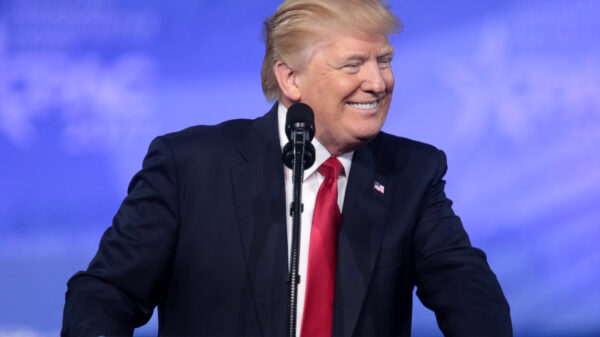Roar writer Cristiana Sandeva on the recently attempted coup at the US Capitol, why we should have seen it coming, and the lessons we can learn for the future.
As most of the western world enters full lockdowns again, the United States of America promptly provides absurdities to watch live on TV. The whole world tuned in to the show displayed on January 6, 2021, from Washington, D.C. Free American citizens were captured breaching constitutional law to impede the rightful transition of power. Dressed in amusing outfits, they still managed to be anything but.
The failed coup attempt at the Capitol was of entertaining nature. Unfortunately, it was neither exciting nor unpredictable.
As things come to an end for Donald Trump, an investigation into how and why things got so bad at the finale is worth some time. In analysing this event and the logistics of American society, three factors are of core importance: capital, the Capitol and capitulation.
Capital
American public reasoning is centred around capital. This is neither a critique nor a praise, but a factual observation. The US is a country where public policy fails to meet basic public needs: the prospect of a nationalised healthcare service, or “Medicare for allâ€, still appears to be a mirage in 2021. It is illegal to have a beer before turning twenty-one, but anyone can buy a revolver at sixteen. The boundary between freedom of action and disorder is blurred, and libertarianism overlaps with arrogance at that muddled intersection.
America has praised itself for being an exemplary model of modern democracy, portrayed as a nation of free thought and free action. While formally the “land of the free”, it has also degenerated into the land of the deliberate. As hard a fact as it may be to admit, Donald Trump entering office four years ago was nothing clamorous – it was the epitome of capital-centred American spirit entering the White House. The story of a real estate magnate with a remarkable record of media appearances ending up sitting in the Oval Office is a deeply American story – it is not unimaginable, and it makes sense. A society which praises the material good of capital above all ethical goods is one whose logical President-elect is an aggressive tycoon.
However, strange as it may sound, it can be argued that this description fit America four years ago far more than it does now. There are positive outcomes to be extracted from the past four years, now that Trump’s presidential term is entering its final countdown. His presidency has been disruptive and destructive, both metaphorically and literally. Over the past four years, Americans have gotten the chance to witness the absurdities and dead-ends of their power structures, embodied by their President, his policy choices, and his manners.
Thanks to the derangement brought on by the Trump presidency, Americans have had the opportunity to reassess their identities, re-evaluate their priorities, and dismantle their beliefs. Some have treasured this opportunity, armed themselves with common sense and egalitarianism to peacefully confront “law and order†throughout the past year. Others have not. Those latter citizens are the ones who violently crashed into the Capitol.
Capitol
Since the events of January 6, Comment pieces from all angles and perspectives are still being published. Stark contrasts have been observed between this riot and the peaceful Black Lives Matter protest in D.C. some months earlier. Sharp analyses of Americans and American society have been provided; footage has been made widely and rapidly available online. The abundance of retrievable visual and written sources afford no excuse to say that what happened that day is not clearly understandable. The dynamics behind this coup attempt are crystal clear, as are the ways in which it developed.
Trump had been advertising his “Save America Rally†in D.C. for days beforehand. Amidst an exhausting pandemic, one of his Instagram posts publicising the event literally called for “BIG CROWDS!â€.

A screenshot of Trump’s Instagram post publicising his March on January 5, 2021.
Rioters were photographed wearing hoodies with “Civil War, Jan. 6 2021†written on them.
The preamble was pompous. The event began massive. Once it got inside Capitol Hill, it turned into a full-scale violent uprising, and it all went downhill.
In 1931, a song entitled “Which side are you on?†quickly became a classical American folk tune, rendered famous by Pete Seeger. Nearly one hundred years later, and four years into the propaganda of “law and order†implemented by Trump, Americans still dwell in a two-fold system dividing oppressive power from woke citizenship.
The attack on the Capitol highlighted the deep inequalities and flaws within that system.
After the attack, the floor is open for questions, reflections and renewal. Among the disorder it has brought, this failed coup has managed to have the positive side effect of strengthening calls for democracy and restoration, and for the eventual capitulation of the one President in American history who refused to leave office.
Capitulation
Ultimately, the magnate President is now a lonely giant. His family members have either begun openly stepping away from him, or have been keeping tacitly around him. His Republican allies have diminished as they begin reckoning their right-wing Republicanism to be different from Trumpism. Mark Zuckerberg has banned Trump from Facebook indefinitely, as has Twitter. As Trump is becoming ever so lonely, so are the Americans who disrupted political activity inside the Capitol a few days ago. The whole world has condemned their failed coup.
America is a fictional fairytale which has degenerated into a plot of absurdity, blood, and greed. Before being all that, it was a land where major cultural development blossomed. Before the commodification and vilification of the American spirit, American voices used to be those of folk singers, beat poets, and non-violent political activists.
During the Trump era, the US reached the climax of its capital-oriented relentlessness and racist systemic structure. From here on, the only way is up. It is going to be a long and rocky road. The upcoming Biden-Harris presidency will have to tackle systemic reformation and work on restoring international recognition of and trust in the American system. The last big wave has crashed into American democracy, but the tide is still high. The next four years will need to be of intense reconstruction, replenishment, and progress. As one very controversial era now comes to a memorable end, the future of America will depend on the responsibility and willpower of its government and citizens to restore a spirit which has been long lost, but which now may be resurrected from the ashes.
















